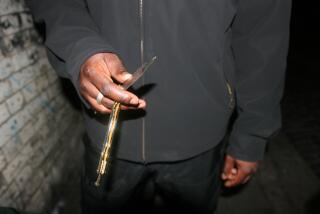British Bobbies May Trade Billy Clubs for Baton : Police: Officers are testing an expandable metal defensive device made in the U.S.
- Share via
FITZWILLIAM, N.H. — Afternoon tea and fish and chips are safe. But one American company is hoping to exert a little influence on another British mainstay--the bobby.
Police officers in Britain, known as bobbies, traditionally carry only 14-inch wooden billy clubs for protection. But in reaction to increasing violence, bobbies are now testing an American-style expandable police baton produced by a small New Hampshire company.
The side-handled PR-24 baton made by Monadnock Lifetime Products Inc. is aluminum and hard plastic. Carried on an officer’s belt, it expands from 14 inches to two feet with the jerk of an arm.
Monadnock, which holds the patent on expandable metal batons, supplies them to nearly 3,000 law enforcement agencies worldwide from a small factory in the woods in Fitzwilliam, which has a population of about 2,000.
The private company, which employs 38 people, is the world’s largest producer of police batons and reported just under $3 million in sales last year. It would not release profit figures.
The British have been testing the batons since January, and the devices have won influential endorsements from the head of the British police chiefs’ association and the country’s home secretary.
British police--known as bobbies since Sir Robert Peel founded the country’s modern police force in the 1820s--have long been unarmed except for their billy clubs.
With more officers being injured in assaults, some involving knives and guns, some 1,880 of the country’s 28,000 officers have been trained and authorized to carry guns.
Home Secretary Michael Howard has said that most bobbies will remain unarmed for “a long, long time to come.” A 1990 survey among officers of all ranks found 86% favored the existing policy of limiting guns to specially trained officers.
Yet top police officials realize they need something more effective than wooden truncheons, says Terry Smith, Monadnock’s training director. They liked the American baton because its primary use is to protect rather than attack.
An officer holding a PR-24 by the side handle can use it to block an assault or to vastly increase leverage for an armlock. So far, Smith says, the batons have gotten a “glowing endorsement” from the British constabulary.
“They were in awe of what you could do,” Smith said.
The company says 25,000 to 30,000 of its expandable batons are now in use worldwide, about one-third of which are the new PR-24s, which cost about $80 apiece.
Company President Paul Starrett said that, if the batons win acceptance in Britain, 1,000 to 2,000 a month could be sold there for several years. He said sales to Britain could total $4 million for the period.
The batons got some bad publicity in 1991 after baton-wielding Los Angeles police officers were videotaped assaulting motorist Rodney King. That incident postponed testing of the PR-24 in Britain for two years, Starrett said.
But Starrett noted that the officers who beat King were not trained in the program endorsed by his company, which instructs officers to use the baton to strike only as a last resort.
“The PR-24 is a very humane, very reasonable device,” Smith said, although he admitted it can be misused. “It’s like a pen. A pen can be used to sign your name or write a check, but it can also be used to write the great American novel.”
More to Read
Sign up for Essential California
The most important California stories and recommendations in your inbox every morning.
You may occasionally receive promotional content from the Los Angeles Times.










